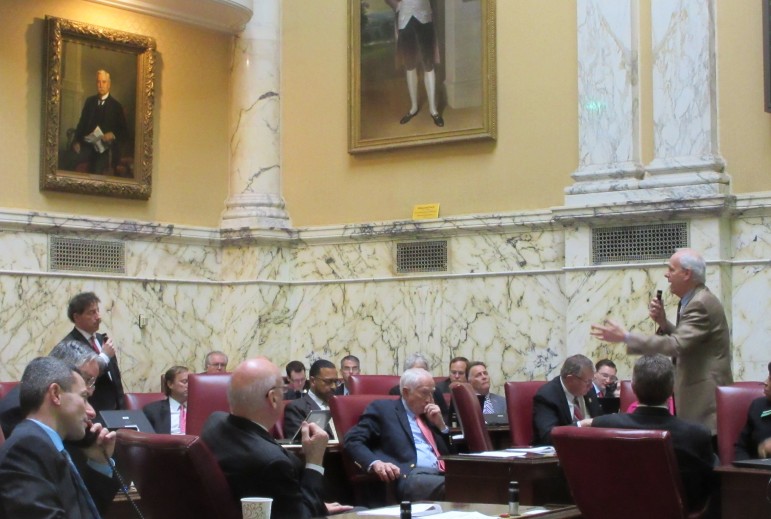Hogan wins school victory
Sens. Jamie Raskin, left, and Paul Pinsky, right, discuss school superintendent bill.
By Barry Rascovar
For MarylandReporter.com
Mixing politics and education can be lethal. They are best kept far apart.
That’s why Maryland, for 100 years, has isolated the governor and state lawmakers from the process of choosing the state superintendent of schools.
Liberal Democrats in the General Assembly, though, sought to change that.
They worry that Republican Gov. Larry Hogan, Jr. might fill the State Board of Education with conservative-leaning members who would name a superintendent with a staunchly right-wing education agenda.
So they floated a bill giving the Senate in Annapolis veto power over the selection of a state schools leader.
That was a very bad idea.
Partisan rubbish
Hogan’s office called it “complete and utter rubbish” and a malevolent attempt to politicize public education. He stood firm along with Republican senators and the bill thankfully died.
Imagine 47 politicians with the ability to manipulate this appointment to serve their own partisan objectives.
Wherever politicians impose their will on educators, bad things can happen in the classroom.
Back in 1914, a study by Abraham Flexner, a noted American educator, concluded Maryland’s public schools were “infested with the vicissitudes of partisan politics.” Two years later, the governor and lawmakers built a dividing wall in which the appointed state board members would, on their own, choose a state school chief for a four-year term.
It’s been that way ever since – and it has worked exceedingly well.
O’Malley vs. Grasmick
When former Democratic Gov. Martin O’Malley took office in 2008, he tried to fire Nancy Grasmick as state school superintendent for political reasons. He soon learned he didn’t have the power and that even his appointees to the state education board backed Grasmick.
O’Malley was thinking only as a politician, trying to oust a school chief beloved by his Republican predecessor, Bob Ehrlich, and by another O’Malley foe, former Gov. William Donald Schaefer.
He ignored the fact that under Grasmick’s two-decade reign, Maryland consistently ranked at the top of state school systems offering an excellent public education.
Yet politicians’ urge to intervene and impose their ideological will on schooling remains strong.
Look at the situation in Baltimore City, a troubled city with a troubled school system.
Costly school reforms
The last superintendent, Andres Alonzo, reenergized city schooling and turned much of the system on its head. But after he suddenly left, the city belatedly discovered Alonzo’s grand plans had been costly, leaving the new superintendent $105 million in the hole.
Indeed, the current city school boss, Gregory Thornton, was brought in largely to make difficult down-sizing choices, which pleased no one. He hasn’t won many fans among community and education activists or with the wannabe power brokers in Baltimore politics.
They are demanding that Thornton be canned. They insist he’s had 18 months to work a miracle and he still hasn’t done it.
Mayoral candidates are promising a takeover of city schools, placing education decisions firmly in the hands of the next mayor and City Council. That will fix everything, right?
Wrong. Very wrong.
Appeasing the multitude
Decisions on education policies are best left to skilled, experienced education managers, overseen by a school board of non-partisan, concerned citizens dedicated to improving the learning environment for children.
Thornton is no neophyte, either, having had considerable success as school chief in Milwaukee in uplifting minority classroom performance and closing a big budget gap.
He may not have Alonzo’s charisma or the ability to appease the multitude of factions vying to control education decisions in Baltimore, but he’s made headway in the face of enormous urban challenges.
His problems could multiply in coming months unless the very same politicians seeking Thornton’s head find a way to persuade the governor to help city schools fend off a new $25 million budget hole caused by declining enrollment.
Hogan has budgeted funds to help three other counties facing that same predicament, but so far he’s shown no willingness to plug in extra money to deal with Baltimore’s far larger enrollment drop.
It was the governor’s adamant opposition to politicizing the state school superintendent’s appointment that forced legislators to abandon their power grab this year. That’s a huge victory for public school children in Maryland.
Following up with added funds to bolster education efforts in Baltimore would be icing on the cake.
Barry Rascovar’s blog is www.politicalmaryland.com. His email address is[email protected]

MarylandReporter.com is a daily news website produced by journalists committed to making state government as open, transparent, accountable and responsive as possible – in deed, not just in promise. We believe the people who pay for this government are entitled to have their money spent in an efficient and effective way, and that they are entitled to keep as much of their hard-earned dollars as they possibly can.

